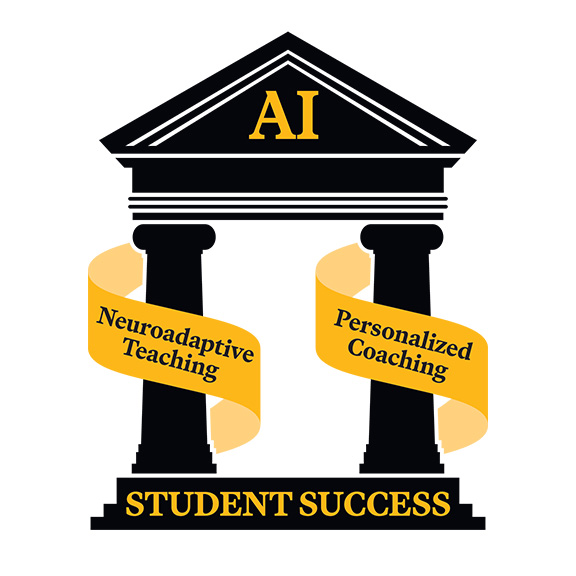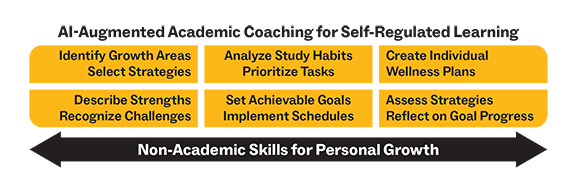
The “Cultivating Neuroadaptive Learning Ecosystems through AI-Powered Personalized Learning” project, funded by the National Science Foundation, will allow the University of Missouri and the University of Connecticut to help transform engineering education by creating innovative tools and strategies that support the success of all students. Grounded in the concept of neurodiversity as the natural variation in how individuals think, learn, and process information, the project embraces the idea that every student brings a unique cognitive profile to the classroom. The project will use artificial intelligence (AI) to build learning environments that flex to meet a wide range of student strengths, needs, and preferences. By integrating AI-driven tutoring, coaching and adaptive teaching strategies, the project empowers learners to thrive academically and personally, while addressing structural barriers in higher education.
Project duration
Aug. 15, 2025-Aug. 14, 2030
Project goals
The project will establish a model for a neuroadaptive learning ecosystem that empowers all learners through personalized learning and support. The ecosystem will be designed to:
- Enhance engagement, support self-regulated learning and shape the engineering identity of all students.
- Promote inclusive academic practices rooted in the ecological model of neurodiversity, considering the unique structures and cultures of engineering colleges public R1 institutions.
Want to know more?
Want to know more about these key concepts? Below are references to get you started – with open access where possible.
Panadero, E. (2017). A review of self-regulated learning: Six models and four directions for research. Frontiers in psychology, 8, 422.
Chrysochoou, M., Zaghi, A. E., & Syharat, C. M. (2022, November). Reframing neurodiversity in engineering education. In Frontiers in Education (Vol. 7, p. 995865). Frontiers Media SA.
Chapman, R. (2021). Neurodiversity and the Social Ecology of Mental Functions. Perspectives on Psychological Science, 16(6), 1360-1372. https://doi.org/10.1177/1745691620959833 (Original work published 2021)
Godwin, A. (2016, June), The Development of a Measure of Engineering Identity Paper presented at 2016 ASEE Annual Conference & Exposition, New Orleans, Louisiana. 10.18260/p.26122
Our approach

The project pillars are two initiatives, powered by AI tools:
Neuroadaptive Teaching
This initiative builds on the Neuroinclusive Teaching framework developed through another RED grant at the University of Connecticut, previously led by Chrysochoou. Titled Beyond Accommodation: Leveraging Neurodiversity for Engineering Innovation, the project focused on the Civil and Environmental Engineering Department, developing a set of I-standards as set of principles for neuroinclusive teaching. Anchored in the Universal Design for Learning (UDL) framework and a strength-based approach, the I-standards emphasize choice, adaptability and communication to empower learning of all students.
The new project aims at integrating AI tools into the classroom, building best practices for its use that align with UDL and considering the different ways that people learn and communicate. Faculty will be co-creators of such practices and collaborate in a learning community setting that allows for intellectual exchange and sharing of experiences. Student experience will center the work, both through engagement and learning outcomes evaluations.
Personalized Coaching
The development of an AI coach will also build on uSucceed an ongoing NSF project led by co-PIs Calyam and Glaser that build a virtual reality platform to teach cybersecurity o individuals with autism, dyslexia, attention-deficit disorders and other neurodevelopmental differences.
The technology platform will be adapted to develop an AI-powered coach to support students with non-academic skills for personal growth. The tool will engage peer mentors and learning assistants to augment their engagement with students, as well as personalize strategies for student success.

Ensuring ethical use of AI and security concerns in both initiatives is critical and the project will adopt IEEE’s Ethically Aligned Design and the NIST AI Risk Management Framework to guide all AI tool development. IEEE’s Ethically Aligned Design provides key principles for responsible AI, including transparency, fairness, and human oversight of autonomous systems that we will embed in our AI coaching and tutoring tools. Likewise, the NIST AI Risk Management Framework (AI RMF 1.0) outlines a structured process (“Map, Measure, Manage, and Govern”) for identifying and mitigating AI risks.